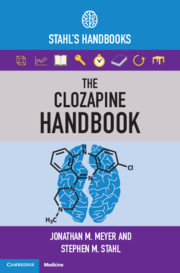Book contents
- The Clozapine Handbook
- The Clozapine Handbook
- Copyright page
- Additional material
- Contents
- Foreword
- Introduction
- 1 The Efficacy Story: Treatment-Resistant Schizophrenia, Psychogenic Polydipsia, Treatment-Intolerant Schizophrenia, Suicidality, Violence, Mania and Parkinson’s Disease Psychosis
- 2 Addressing Clozapine Positive Symptom Nonresponse in Schizophrenia Spectrum Patients
- 3 Initiating Clozapine
- 4 Discontinuing Clozapine and Management of Cholinergic Rebound
- 5 Binding Profile, Metabolism, Kinetics, Drug Interactions and Use of Plasma Levels
- 6 Understanding Hematologic Monitoring and Benign Ethnic Neutropenia
- 7 Managing Constipation
- 8 Managing Sedation, Orthostasis and Tachycardia
- 9 Managing Sialorrhea
- 10 Managing Seizure Risk and Stuttering
- 11 Managing Metabolic Adverse Effects
- 12 Fever, Myocarditis, Interstitial Nephritis, DRESS, Serositis and Cardiomyopathy
- 13 Managing Enuresis and Incontinence, Priapism, Venous Thromboembolism, Neuroleptic Malignant Syndrome, Tardive Dyskinesia and Obsessive Compulsive Disorder
- 14 Eosinophilia, Leukocytosis, Thrombocytopenia, Thrombocytosis, Anemia, Hepatic Function Abnormalities
- 15 Special Topics: Child and Adolescent Patients, Elderly Patients, Patients With Intellectual Disability, Pregnancy and Risk for Major Congenital Malformation, Lactation, Overdose, Postmortem Redistribution
- Index
- References
14 - Eosinophilia, Leukocytosis, Thrombocytopenia, Thrombocytosis, Anemia, Hepatic Function Abnormalities
Published online by Cambridge University Press: 19 October 2021
- The Clozapine Handbook
- The Clozapine Handbook
- Copyright page
- Additional material
- Contents
- Foreword
- Introduction
- 1 The Efficacy Story: Treatment-Resistant Schizophrenia, Psychogenic Polydipsia, Treatment-Intolerant Schizophrenia, Suicidality, Violence, Mania and Parkinson’s Disease Psychosis
- 2 Addressing Clozapine Positive Symptom Nonresponse in Schizophrenia Spectrum Patients
- 3 Initiating Clozapine
- 4 Discontinuing Clozapine and Management of Cholinergic Rebound
- 5 Binding Profile, Metabolism, Kinetics, Drug Interactions and Use of Plasma Levels
- 6 Understanding Hematologic Monitoring and Benign Ethnic Neutropenia
- 7 Managing Constipation
- 8 Managing Sedation, Orthostasis and Tachycardia
- 9 Managing Sialorrhea
- 10 Managing Seizure Risk and Stuttering
- 11 Managing Metabolic Adverse Effects
- 12 Fever, Myocarditis, Interstitial Nephritis, DRESS, Serositis and Cardiomyopathy
- 13 Managing Enuresis and Incontinence, Priapism, Venous Thromboembolism, Neuroleptic Malignant Syndrome, Tardive Dyskinesia and Obsessive Compulsive Disorder
- 14 Eosinophilia, Leukocytosis, Thrombocytopenia, Thrombocytosis, Anemia, Hepatic Function Abnormalities
- 15 Special Topics: Child and Adolescent Patients, Elderly Patients, Patients With Intellectual Disability, Pregnancy and Risk for Major Congenital Malformation, Lactation, Overdose, Postmortem Redistribution
- Index
- References
Summary
One need not specialize in hematology to prescribe clozapine, but the concern about neutropenia compels all clinicians to develop expertise with concepts such as benign ethnic neutropenia (BEN), and the dose-dependent impact of divalproex/valproate on neutrophil counts and neutropenia risk. The mandatory monitoring has also revealed a propensity for clozapine to induce other hematological abnormalities including eosinophilia, neutrophilia, abnormal platelet counts, and anemia. This spectrum of hematologic abnormalities is not unique to clozapine, but an analysis of 285 antipsychotic-treated patients found that persistent anemia, neutrophilia and eosinophilia occurred at significantly higher rates compared to other antipsychotics during the first 18 weeks of therapy. A retrospective Canadian study of 1-year hematologic outcomes among 101 new clozapine starts found a cumulative incidence of 48.9% for neutrophilia (> 7500/mm3), 5.9% for eosinophilia (> 1500/mm3), and 3% each for thrombocytosis (> 500,000/mm3) and thrombocytopenia (< 100,000/mm3). An Italian study of 2404 patients reported a leukocytosis rate of 7.7% using the total WBC threshold of 15,000/mm3. Most of the aberrations were self-limited and did not necessitate treatment interruption. Anemia may have multiple causes, and one study of 96 new clozapine starts found that 24.5% developed anemia during the first 2 years of treatment, but it was not a cause of treatment discontinuation.
- Type
- Chapter
- Information
- The Clozapine HandbookStahl's Handbooks, pp. 258 - 275Publisher: Cambridge University PressPrint publication year: 2019

